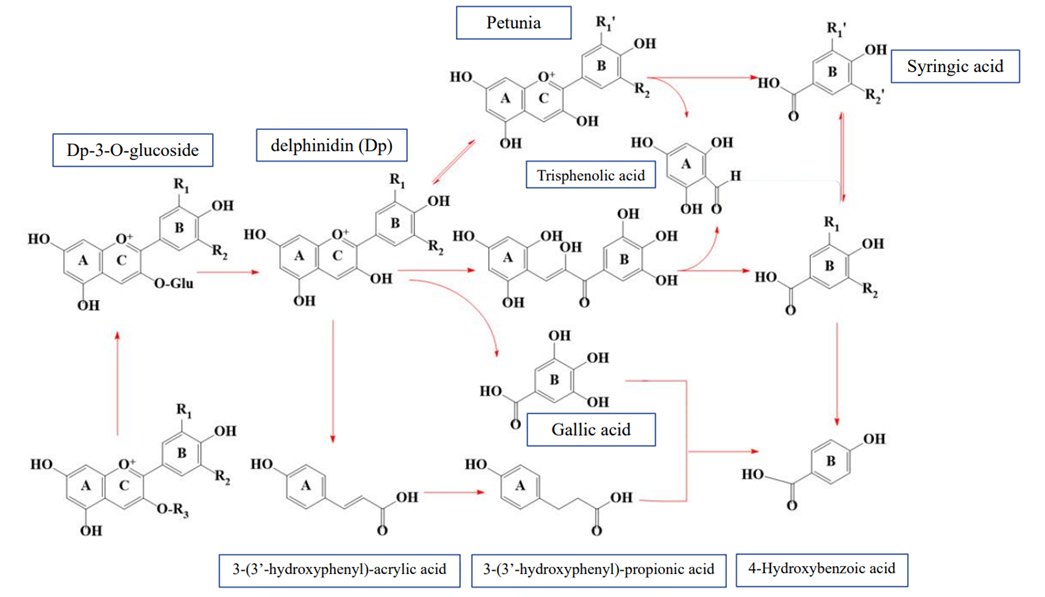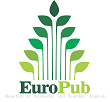Research progress of anthocyanins regulating intestinal microorganisms
DOI:
https://doi.org/10.18686/fnc.v2i1.185Keywords:
anthocyanin; intestinal microorganismAbstract
Anthocyanins are a kind of glycoside derivatives with C6-C3-C6 as the skeleton widely existing in various fruits and vegetables. In addition to giving food its bright color, anthocyanins have a variety of biological health effects on the human body. In this paper, the structure, distribution, and content of anthocyanins and the research progress of anthocyanins and their metabolites on intestinal microbiological regulation in recent years were reviewed in order to provide a theoretical basis for further development of nutritive and healthy food rich in anthocyanins.

Downloads
Published
How to Cite
Issue
Section
License
Copyright (c) 2024 Yixin Li, Rui Zhang, Jiadan Du, Yushan Liu, Yumeng Zhang, Jiayi Liu, Min Wang, Lin Han

This work is licensed under a Creative Commons Attribution 4.0 International License.
References
1. Castaldo L, Narváez A, Izzo L, et al. Red wine consumption and cardiovascular health. Molecules. 2019; 24(19): 3626. doi: 10.3390/molecules24193626 DOI: https://doi.org/10.3390/molecules24193626
2. Li Q, Zhou M, Wang C, et al. Effects of interaction between lotus proanthocyanidins and metal ions on antioxidant properties (Chinese). Journal of Chinese Institute of Food Science and Technology. 2019; 19(2): 37-46. doi: 10.16429/j.1009-7848.2019.02.006
3. Ren J, Li F, Lei L, et al. Effects of interactions between procyanidins and pectins on processing properties of fruits and vegetables: A review (Chinese). Food and Fermentation Industries. 2019; 45(12): 83-88. doi: 10.13995/j.cnki.11-1802/ts.019217
4. Zheng H, Liu J, Gao M, et al. Research status and prospects of blueberry anthocyanins (Chinese). Guizhou Agricultural Sciences. 2014; 42(1): 59-64. doi: 10.3969/j.issn.1001-3601.2014.01.016
5. Fang J. Bioavailability of anthocyanins. Drug Metabolism Reviews. 2014; 46(4): 508-520. doi: 10.3109/03602532.2014.978080 DOI: https://doi.org/10.3109/03602532.2014.978080
6. Sui X, Sun H, Qi B, et al. Functional and conformational changes to soy proteins accompanying anthocyanins: Focus on covalent and non-covalent interactions. Food Chemistry. 2018; 245: 871-878. doi: 10.1016/j.foodchem.2017.11.090 DOI: https://doi.org/10.1016/j.foodchem.2017.11.090
7. Wang H, Zhu H, Li W, Ruan M. Anthocyanins in mulberry extract and their in vitro antioxidant activity (Chinese). Food and Fermentation Industries. 2019; 45(15): 170-175. doi: 10.13995/j.cnki.11-1802/ts.020489
8. Tharrey M, Mariotti F, Mashchak A, et al. Patterns of plant and animal protein intake are strongly associated with cardiovascular mortality: The Adventist Health Study-2 cohort. International Journal of Epidemiology. 2018; 47(5): 1603-1612. doi: 10.1093/ije/dyy030 DOI: https://doi.org/10.1093/ije/dyy030
9. Delgado Cuzmar P, Salgado E, Ribalta‐Pizarro C, et al. Phenolic composition and sensory characteristics of Cabernet Sauvignon wines: effect of water stress and harvest date. International Journal of Food Science & Technology. 2018; 53(7): 1726-1735. doi: 10.1111/ijfs.13757 DOI: https://doi.org/10.1111/ijfs.13757
10. Xie Y, Zhu X, Li Y, et al. Analysis of the pH-Dependent Fe(III) Ion chelating activity of anthocyanin extracted from black soybean [Glycine max (L.) Merr.] coats. Journal of Agricultural and Food Chemistry. 2018; 66(5): 1131-1139. doi: 10.1021/acs.jafc.7b04719 DOI: https://doi.org/10.1021/acs.jafc.7b04719
11. Wang H, Qiao S, Tian H, et al. Determination of anthocyanins in blueberry wine by high-performance liquid chromatography (Chinese). Food and Fermentation Industries. 2020; 46(8): 280-284. doi: 10.13995/j.cnki.11-1802/ts.022040
12. Baron G, Altomare A, Regazzoni L, et al. Pharmacokinetic profile of bilberry anthocyanins in rats and the role of glucose transporters: LC–MS/MS and computational studies. Journal of Pharmaceutical and Biomedical Analysis. 2017; 144: 112-121. doi: 10.1016/j.jpba.2017.04.042 DOI: https://doi.org/10.1016/j.jpba.2017.04.042
13. Zhang J, Wang X, Tian C, et al. Analysis of phenolic compounds in red grape varieties (Chinese). doi: 10.3864/j.issn.0578-1752.2015.07.12
14. Zhang Y, Kong X, Wang H, et al. Analysis of anthocyanin content and components of different varieties of purple sweet potato (Chinese). Journal of Jiangsu Normal University (Natural Science Edition). 2019; 37(2): 26-30. doi: 10.3969/j.issn.2095-4298.2019.02.006
15. Yang X, Chen W, He F, Wang J. Analysis of differences in anthocyanin composition of five red wine grape varieties (Chinese). Acta Agriculturae Boreali-Occidentalis Sinica. 2017; 26(11): 1648-1654. doi: 10.7606/j.issn.1004-1389.2017.11.011
16. Yin L, Peng Y, Zhong C, et al. Determination of anthocyanidin composition of different pigmented potato (Solanum tuberosum L.) cultivars by HPLC (Chinese). Food Science. 2015; 36(18): 143-147. doi: 10.7506/spkx1002-6630-201518026
17. Yin L, Wei X, Zhong C, et al. Total anthocyanin content and total antioxidant activity of different varieties of colored potatoes (Chinese). Food Science. 2014; 35(5): 96-100. doi: 10.7506/spkx1002-6630-201405019
18. Ajay K P, Sivakumar T R, Jin C, et al. Antioxidant and hemolysis protective effects of polyphenol-rich extract from mulberry fruits. Pharmacognosy Magazine, 2018, 14(53): 103-109. doi: 10.4103/pm.pm_491_16 DOI: https://doi.org/10.4103/pm.pm_491_16
19. Chen L, Xin X, Wang Y, Yuan Q. Analysis of content and compositions of anthocyanins in red raspberry (Chinese). Food and Fermentation Industries. 2011; 37(05): 166-169. doi: 10.13995/j.cnki.11-1802/ts.2011.05.018
20. Zhao S, Xi Q, Li X, et al. Determination of anthocyanins in colored rice by ultra-high performance liquid chromatography (Chinese). Food and Fermentation Industries. 2018; 44(11): 301-306. doi: 10.13995/j.cnki.11-1802/ts.016228
21. Lian Y, Meng Z, Gu R, et al. Research progress on quantitative analysis and absorption metabolism of blueberry anthocyanins (Chinese). Military Medical Sciences. 2021; 45(02): 156-161. doi: 10.7644/j.issn.1674-9960.2021.02.015
22. Duan Z, Dou Z, He A, et al. Extraction and antioxidant activity of polyphenols from green kumquat peel (Chinese). Science and Technology of Food Industry. 2015; 36(10): 244-248. doi: 10.13386/j.issn1002-0306.2015.10.043
23. Chen L, Xin X, Yuan Q. Analysis of anthocyanin components in wild mulberries (Chinese). Science and Technology of Food Industry. 2012; 33(15): 307-310.
24. Kalt W, Blumberg JB, McDonald JE, et al. Identification of Anthocyanins in the Liver, Eye, and Brain of Blueberry-Fed Pigs. Journal of Agricultural and Food Chemistry. 2008; 56(3): 705-712. doi: 10.1021/jf071998l DOI: https://doi.org/10.1021/jf071998l
25. Gill CIR, McDougall GJ, Glidewell S, et al. Profiling of Phenols in Human Fecal Water after Raspberry Supplementation. Journal of Agricultural and Food Chemistry. 2010; 58(19): 10389-10395. doi: 10.1021/jf1017143 DOI: https://doi.org/10.1021/jf1017143
26. Shi C, Kong D, Xu C, et al. Study on in vitro simulated digestion and antioxidant properties of black wolfberry (Chinese). Journal of Gansu Agricultural University. 2023; 58(5): 149-155, 162. doi: 10.13432/j.cnki.jgsau.2023.05.017
27. Peng Z. Study on the mechanism of black rice anthocyanins regulating endoplasmic reticulum stress and enhancing RPE cell barrier function [Master’s thesis] (Chinese). Central South University of Forestry and Technology; 2023. doi: 10.27662/d.cnki.gznlc.2022.000771
28. Li Z. Study on the mechanism of action of black fruit and wolfberry anthocyanins Pt3G on ROS/PTEN/PI3K/Akt signaling pathway in prostate cancer cells [Master’s thesis] (Chinese). Ningxia Medical University; 2022. doi: 10.27258/d.cnki.gnxyc.2021.000035
29. Liu Y, Wu Y, Ji B. Composition changes and antioxidant activity of blueberry polyphenols during gastrointestinal digestion (Chinese). Journal of Chinese Institute of Food Science and Technology. 2016; 16(10): 197-203. doi: 10.16429/j.1009-7848.2016.10.027
30. Liu Q, Ou Y, Zhou Q, et al. Nutrient uptake of anthocyanins and their impacts on colon cancer (Chinese). Food Science. 2017; 38(17): 301-305. doi: 10.7506/spkx1002-6630-201717048
31. Shao S, Zhao J, Zhang L, et al. Effects of anthocyanins from Opuntia ficus-indica on gut microbiota and metabolites SCFAs based on fermentation in vitro (Chinese). Science and Technology of Food Industry. 2022; 43(24): 377-385. doi: 10.13386/j.issn1002-0306.2022030122
32. Yue W, Wu L, Han F. In Vitro simulated fermentation evaluation of effects of dry matter and anthocyanins in red wine on intestinal microbiota (Chinese). Food Science. 2022; 43(11): 121-129. doi: 10.7506/spkx1002-6630-20210506-044
33. Zhao L, Chen Y. Study on the antibacterial effect of black rice anthocyanins in vitro (Chinese). China Food Safety Magazine. 2019; 24: 176. doi: 10.16043/j.cnki.cfs.2019.24.142
34. Woodward G, Kroon P, Cassidy A, et al. Anthocyanin stability and recovery: implications for the analysis of clinical and experimental samples. Journal of Agricultural and Food Chemistry. 2009; 57(12): 5271-5278. doi: 10.1021/jf900602b DOI: https://doi.org/10.1021/jf900602b
35. Faria A, Fernandes I, Norberto S, et al. Interplay between anthocyanins and gut microbiota. Journal of Agricultural and Food Chemistry. 2014; 62(29): 6898-6902. doi: 10.1021/jf501808a DOI: https://doi.org/10.1021/jf501808a
36. Peixoto FM, Senna Gouvêa ACM, et al. Characterization and bioaccessibility of anthocyanins from blueberry (Vaccinium corymbosum L.) after simulated gastro-intestinal digestion: A positive effect on malvidin derivatives. Fruits. 2018; 73(2): 101-109. doi: 10.17660/th2018/73.2.2 DOI: https://doi.org/10.17660/th2018/73.2.2
37. Wei L, Lin Y, Wang Y, Meng X. Optimization of extraction of anthocyanins from berries of aronia melanocarpa and their antioxidant activity and composition (Chinese). Food Science. 2018; 39(12): 239-246. doi: 10.7506/spkx1002-6630-201812037
38. Chen Y, Li Q, Zhao T, et al. Biotransformation and metabolism of three mulberry anthocyanin monomers by rat gut microflora. Food Chemistry. 2017; 237: 887-894. doi: 10.1016/j.foodchem.2017.06.054 DOI: https://doi.org/10.1016/j.foodchem.2017.06.054
39. Hahm TH, Tanaka M, Nguyen HN, et al. Matrix-assisted laser desorption/ionization mass spectrometry-guided visualization analysis of intestinal absorption of acylated anthocyanins in Sprague-Dawley rats. Food Chemistry. 2021; 334: 127586. doi: 10.1016/j.foodchem.2020.127586 DOI: https://doi.org/10.1016/j.foodchem.2020.127586
40. Sekirov I, Russell SL, Antunes LCM, et al. Gut microbiota in health and disease. Physiological Reviews. 2010; 90(3): 859-904. doi: 10.1152/physrev.00045.2009 DOI: https://doi.org/10.1152/physrev.00045.2009
41. Zhou L, Xie M, Yang F, et al. Antioxidant activity of high purity blueberry anthocyanins and the effects on human intestinal microbiota. LWT-Food Science and Technology. 2020; 117: 108621. doi: 10.1016/j.lwt.2019.108621 DOI: https://doi.org/10.1016/j.lwt.2019.108621
42. Hidalgo M, Oruna-Concha MJ, Kolida S, et al. Metabolism of anthocyanins by human gut microflora and their influence on gut bacterial growth. Journal of Agricultural and Food Chemistry. 2012; 60(15): 3882-3890. doi: 10.1021/jf3002153 DOI: https://doi.org/10.1021/jf3002153
43. Chen L, Jiang B, Zhong C, et al. Chemoprevention of colorectal cancer by black raspberry anthocyanins involved the modulation of gut microbiota and SFRP2 demethylation. Carcinogenesis. 2018; 39(3): 471-481. doi: 10.1093/carcin/bgy009 DOI: https://doi.org/10.1093/carcin/bgy009
44. Jiang L, Meng X, Yang F. Study on the antibacterial effect of purple sweet potato anthocyanin pigments (Chinese). China Food Additives. 2017; 3: 106-110. doi: 10.3969/j.issn.1006-2513.2017.03.009
45. Gong X, Wang B, Lu X, et al. Purification of anthocyanins from ‘Bitter Water Rose’ and its antibacterial activity (Chinese). Journal of Gansu Agricultural University. 2018; 53(4): 168-176. doi: 10.13432/j.cnki.jgsau.2018.04.02
46. Wu Y, Xu L, Pu S, et al. Optimization of the extraction process of total anthocyanins in blackberries and research on their antioxidant and antibacterial properties (Chinese). Food Research and Development. 2021; 42(11): 95-102. doi: 10.12161/j.issn.1005-6521.2021.11.016
47. Lu J, Dun H, Xiang X, et al. Effect of in vitro simulated gastrointestinal digestion on bioactive components and antioxidant activities of six kinds of black foods (Chinese). Food Science. 2018; 39(5): 47-56. doi: 10.7506/spkx1002-6630-201805008
48. Tang J, Wang H, Tong M, et al. Research progress on anthocyanins of Lonicera caerulea L. (Chinese). Food Research and Development. 2020; 41(16): 220-224. doi: 10.12161/j.issn.1005-6521.2020.16.037
49. Wang Y, Yang G, Ma X, et al. Study on the antibacterial mechanism of endophytic fungus Alternaria ethyl acetate extract against Escherichia coli (Chinese). Chinese Traditional and Herbal Drugs. 2018; 49(2): 374-381.
50. Wang Y, Jiang T, Wang Q. Physical and chemical properties and antifungal mechanism of antifungal protein produced by antagonistic strain Bacillus subtilis ZL2-70 against Verticillium dahilae (Chinese). Cotton Science. 2017; 29(6): 560-569. doi: 10.11963/1002-7807.wydwq.20171011
51. Vendrame S, Del Bo’ C, Ciappellano S, et al. Berry fruit consumption and metabolic syndrome. Antioxidants. 2016; 5(4): 34. doi: 10.3390/antiox5040034 DOI: https://doi.org/10.3390/antiox5040034
52. Peng Y, Yan Y, Wan P, et al. Effects of long-term intake of anthocyanins from Lycium ruthenicum Murray on the organism health and gut microbiota in vivo. Food Research International. 2020; 130: 108952. doi: 10.1016/j.foodres.2019.108952 DOI: https://doi.org/10.1016/j.foodres.2019.108952
53. Ali HM, Almagribi W, Al-Rashidi MN. Antiradical and reductant activities of anthocyanidins and anthocyanins, structure-activity relationship and synthesis. Food Chemistry. 2016; 194: 1275-1282. doi: 10.1016/j.foodchem.2015.09.003 DOI: https://doi.org/10.1016/j.foodchem.2015.09.003




.jpg)
.jpg)

